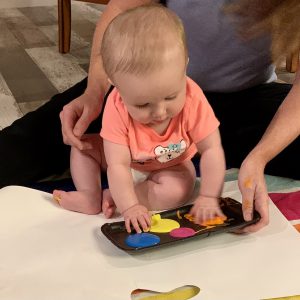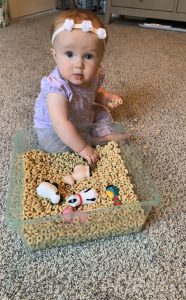In the early childhood years there are key experiences that are essential to development. Babies and toddlers benefit from sensory activities and it is important for overall health and well-being. When does sensory development start? The answer is before we are born. Everything we do as humans involves our senses. In a child’s first five years, sensory play supports cognitive development, language, problem solving, and social and emotional interaction as well as motor development. Research shows that sensory play is needed for children to develop more complex learning abilities as they grow.
During the first twelve months, an infant begins to build an understanding of their world. It can seem like a challenging time because they are often exploring with their mouth. There are some simple activities that are both safe and entertaining for babies at this age.
Sensory bins are hands-on interactive tools that use sight, touch, taste, hearing and smell. A sensory bin can also be used to hide and find objects which creates an opportunity to encourage language development. Fine motor skills can be developed by using the pinching, grasping, scooping, pouring, and stirring movements with a variety of tools. Sensory bins can be inexpensive and switched out easily to create strength and hand development.
Sensory Bin Ideas
- Sponges and Water
- Cooked pasta with food coloring
- Dry Cereal with or without toys
- Oobleck (2 cups cornstarch and 1 cup water)
- Gelatin
Outdoor sensory play is another great way to use multi-sensory experiences for healthy child development. Outdoor equipment at home or the park can be used. Simple experiences with grass, sand and water encourage exploration and creativity. A reserved child may come out of their shell when outdoors. Nature opportunities will provide health benefits of fresh air, exercise, and vitamin D.
Outdoor Sensory Ideas
- Sit in the grass
- Crawl in the sand
- Smell the flowers
- Touch the leaves
- Take a nature walk
- Have a picnic
- Read a book
As a care giver, you can focus on a certain skill that may be lacking in a child’s development or provide an array of activities that stimulate growth. When children can explore and try new experiences they can attach meaning and unlock key skills needed for their future. Sensory play is valuable and essential for learning and the activities are endless.
- More Trees, Please - January 13, 2022
- Baby Sensory Play - August 27, 2021
- Meet Your FCS Agent: Julie McMillian - August 24, 2021



